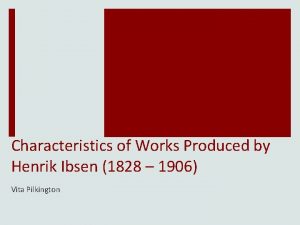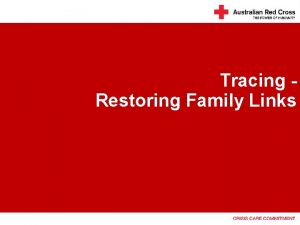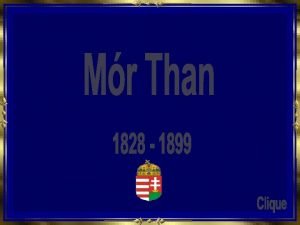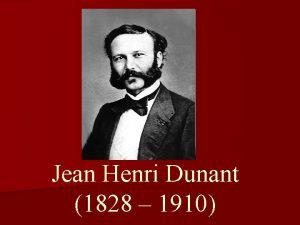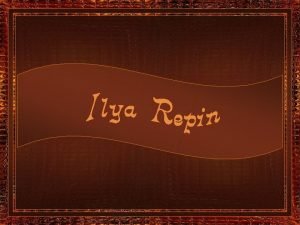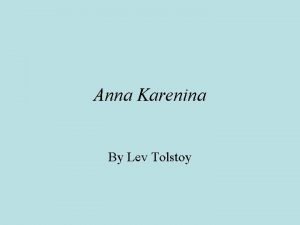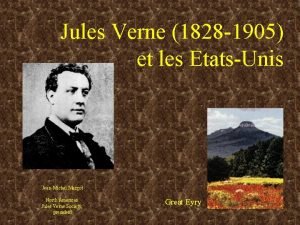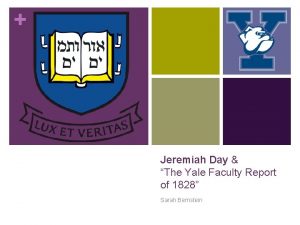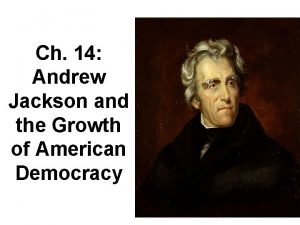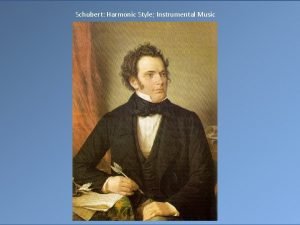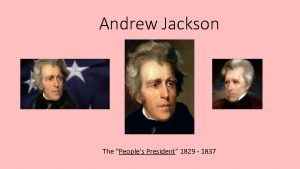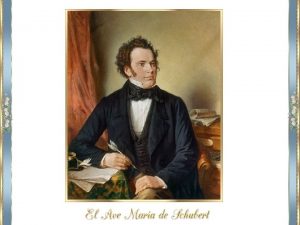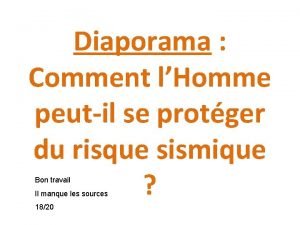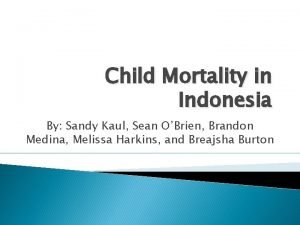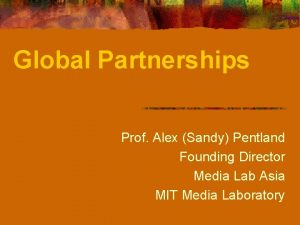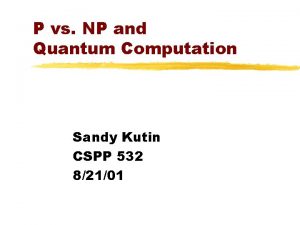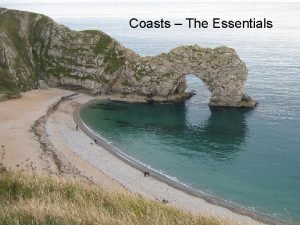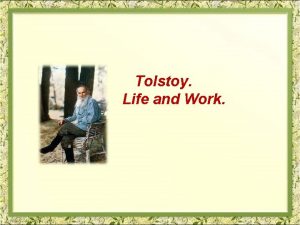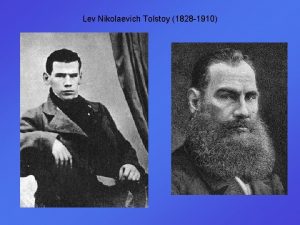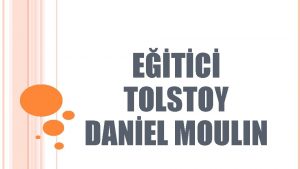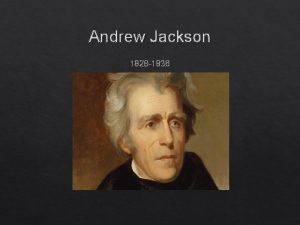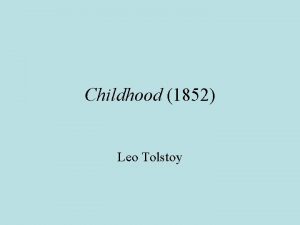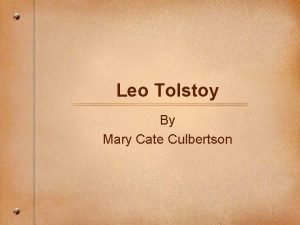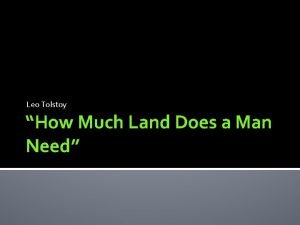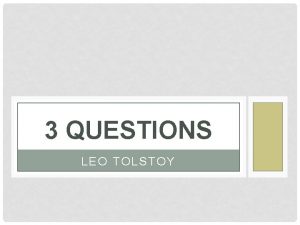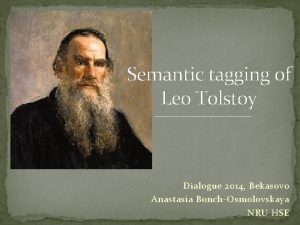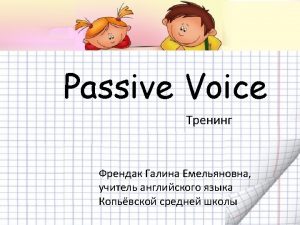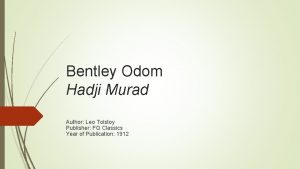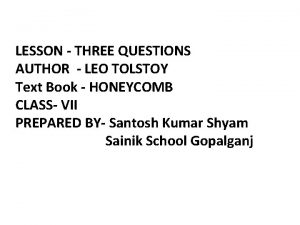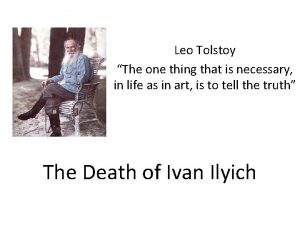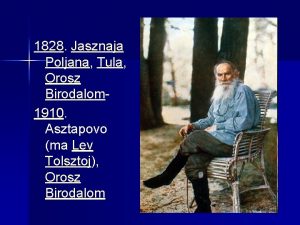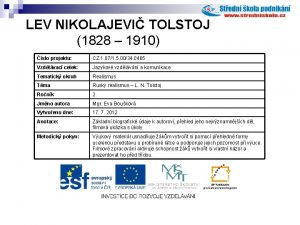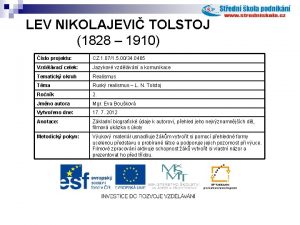Leo Tolstoy 1828 1910 Leo R Sandy Leo



























- Slides: 27

Leo Tolstoy 1828 -1910 Leo R. Sandy

Leo Tolstoy was a Russian writer who is regarded as one of the greatest authors of all time Born to an aristocratic Russian family in 1828, he is best known for the novels War and Peace (1869) and Anna Karenina (1877), often cited as pinnacles of realist fiction He first achieved literary acclaim in his twenties with his semiautobiographical trilogy, Childhood, Boyhood, and Youth (1852– 1856), and Sevastopol Sketches (1855), based upon his experiences in the Crimean War Tolstoy's fiction includes dozens of short stories and several novellas such as The Death of Ivan Ilyich (1886), Family Happiness (1859), and Hadji Murad (1912). He also wrote plays and numerous philosophical essays

In the 1870 s Tolstoy experienced a profound moral crisis, followed by what he regarded as an equally profound spiritual awakening, as outlined in his non-fiction work A Confession (1882) His literal interpretation of the ethical teachings of Jesus, centering on the Sermon on the Mount, caused him to become a fervent Christian anarchist and pacifist Tolstoy's ideas on nonviolent resistance, expressed in such works as The Kingdom of God Is Within You (1894), were to have a profound impact on such pivotal 20 th-century figures as Mohandas Karamchand Gandhi, and Martin Luther King, Jr. The Tolstoys were a well-known family of old Russian nobility who traced their ancestry to a mythical nobleman named Indris described by Pyotr Tolstoy as arriving "from Nemec, from the lands of Caesar" to Chernigov in 1353 along with his two sons Litvinos (or Litvonis) and Zimonten (or Zigmont) and a druzhina of 3000 people.

Tolstoy was born at Yasnaya Polyana, a family estate 12 kilometres (7. 5 mi) southwest of Tula, Russia, and 200 kilometers (120 mi) south of Moscow. He was the fourth of five children of Count Nikolai Ilyich Tolstoy (1794– 1837), a veteran of the Patriotic War of 1812, and Countess Mariya Tolstaya (née Volkonskaya; 1790– 1830) After his parents died during his childhood, Tolstoy and his siblings were brought up by relatives. In 1844, he began studying law and oriental languages at Kazan University His time there was not a success however, with teachers describing him as "both unable and unwilling to learn. ” Tolstoy left the university in the middle of his studies, returned to Yasnaya Polyana and then spent much of his time in Moscow, Tula and Saint Petersburg, leading a lax and leisurely lifestyle.

Age 20, 1848

He began writing during this period, including his first novel Childhood, a fictitious account of his own youth, which was published in 1852. In 1851, after running up heavy gambling debts, he went with his older brother to the Caucasus and joined the army Tolstoy served as a young artillery officer during the Crimean War and was in Sevastopol during the 11 -month-long siege of Sevastopol in 1854– 55, including the Battle of the Chernaya During the war he was recognized for his bravery and courage and promoted to lieutenant. He was appalled by the number of deaths involved in warfare, and left the army after the end of the Crimean War His conversion from a dissolute and privileged society author to the non-violent and spiritual anarchist of his latter days was brought about by his experience in the army as well as two trips around Europe in 1857 and 1860– 61

During his 1857 visit, Tolstoy witnessed a public execution in Paris, a traumatic experience that would mark the rest of his life. Writing in a letter to his friend Vasily Botkin: "The truth is that the State is a conspiracy designed not only to exploit, but above all to corrupt its citizens. . . Henceforth, I shall never serve any government anywhere Tolstoy's concept of non-violence or Ahimsa was bolstered when he read a German version of the Tirukkural (written by Valluvar, the Kural emphasizes on the vital principles of nonviolence, moral vegetarianism or veganism, human brotherhood, absence of desires, path of righteousness and truth) He later instilled the concept in Mahatma Gandhi through his A Letter to a Hindu when young Gandhi corresponded with him seeking his advice

His European trip in 1860– 61 shaped both his political and literary development when he met Victor Hugo, whose literary talents Tolstoy praised after reading Hugo's newly finished Les Misérables. The similar evocation of battle scenes in Hugo's novel and Tolstoy's War and Peace indicates this influence Tolstoy's political philosophy was also influenced by a March 1861 visit to French anarchist Pierre-Joseph Proudhon, then living in exile under an assumed name in Brussels Apart from reviewing Proudhon's forthcoming publication, La Guerre et la Paix (War and Peace in French), whose title Tolstoy would borrow for his masterpiece, the two men discussed education, as Tolstoy wrote in his educational notebooks: "If I recount this conversation with Proudhon, it is to show that, in my personal experience, he was the only man who understood the significance of education and of the printing press in our time. "

Fired by enthusiasm, Tolstoy returned to Yasnaya Polyana and founded 13 schools for the children of Russia's peasants, who had just been emancipated from serfdom in 1861 Tolstoy's educational experiments were short-lived, partly due to harassment by the Tsarist secret police. However, as a direct forerunner to A. S. Neill's Summerhill School, the school at Yasnaya Polyana can justifiably be claimed the first example of a coherent theory of democratic education The death of his brother Nikolay in 1860 had an impact on Tolstoy, and led him to a desire to marry On 23 September 1862, Tolstoy married Sophia Andreevna Behrs, who was 16 years his junior and the daughter of a court physician. She was called Sonya, the Russian diminutive of Sofia, by her family and friends. They had 13 children, eight of whom survived childhood (high birthrates coincide with high infant morality)

Sofia and Alexandria

Their early married life was happy and allowed Tolstoy much freedom and the support system to compose War and Peace and Anna Karenina with Sonya acting as his secretary, editor, and financial manager Their later life together has been described by as one of the unhappiest in literary history. Tolstoy's relationship with his wife deteriorated as his beliefs became increasingly radical This saw him seeking to reject his inherited and earned wealth, including the renunciation of the copyrights on his earlier works Some of the members of the Tolstoy family left Russia in the aftermath of the 1905 Russian Revolution and the subsequent establishment of the Soviet Union, and many of Leo Tolstoy's relatives and descendants today live in Sweden, Germany, the United Kingdom, France and the United States

1897

One of his great-grandsons, Vladimir Tolstoy (born 1962), is a director of the Yasnaya Polyana museum since 1994 and an adviser to the President of Russia on cultural affairs since 2012 Tolstoy served as a second lieutenant in an artillery regiment during the Crimean War, recounted in his Sevastopol Sketches. His experiences in battle helped stir his subsequent pacifism and gave him material for realistic depiction of the horrors of war in his later work War and Peace is generally thought to be one of the greatest novels ever written, remarkable for its dramatic breadth and unity In his novel Resurrection, Tolstoy attempts to expose the injustice of man-made laws and the hypocrisy of institutionalized church

In 1884, Tolstoy wrote a book called What I Believe, in which he openly confessed his Christian beliefs. He affirmed his belief in Jesus Christ's teachings and was particularly influenced by the Sermon on the Mount, and the injunction to turn the other cheek, which he understood as a "commandment of nonresistance to evil by force" and a doctrine of pacifism and nonviolence In his work The Kingdom of God Is Within You, he explains that he considered mistaken the Church's doctrine because they had made a "perversion" of Christ's teachings Tolstoy also received letters from American Quakers who introduced him to the non-violence writings of Quaker Christians such as George Fox, William Penn and Jonathan Dymond

Gandhi and Others at Tolstoy Farm in South Africa

Tolstoy believed being a Christian required him to be a pacifist; the consequences of being a pacifist, and the apparently inevitable waging of war by government, are the reason why he is considered a philosophical anarchist Tolstoy believed that a true Christian could find lasting happiness by striving for inner self-perfection through following the Great Commandment of loving one's neighbor and God rather than looking outward to the Church or state for guidance His belief in nonresistance when faced by conflict is another distinct attribute of his philosophy based on Christ's teachings By directly influencing Mahatma Gandhi with this idea through his work The Kingdom of God Is Within, Tolstoy's profound influence on the nonviolent resistance movement reverberates to this day

He believed that the aristocracy were a burden on the poor, and that the only solution to how we live together is through anarchism (rejects the idea that human governments have ultimate authority over human societies and sees government as violent, deceitful, and, when glorified, idolatrous (nationalism) He also opposed private property in land ownership; and the institution of marriage; he valued the ideals of chastity and sexual abstinence (as Gandhi did) From the teachings of Jesus he deduced the rule of nonresistance and the absolute condemnation of all wars Reading Tolstoy's The Kingdom of God Is Within You also convinced Gandhi to avoid violence and espouse nonviolent resistance, a debt Gandhi acknowledged in his autobiography, calling Tolstoy "the greatest apostle of non-violence that the present age has produced"

The correspondence between Tolstoy and Gandhi would only last a year, from October 1909 until Tolstoy's death in November 1910, but led Gandhi to give the name Tolstoy Colony to his second ashram in South Africa. Besides nonviolent resistance, the two men shared a common belief in the merits of vegetarianism, the subject of several of Tolstoy's essays Tolstoy also became a major supporter of the Esperanto movement. Tolstoy was impressed by the pacifist beliefs of the Doukhobors and brought their persecution to the attention of the international community, after they burned their weapons in peaceful protest in 1895. He aided the Doukhobors in migrating to Canada In 1904, during the Russo-Japanese War, Tolstoy condemned the war and wrote to the Japanese Buddhist priest Soyen Shaku in a failed attempt to make a joint pacifist statement

Tolstoy died in 1910, at the age of 82. Just prior to his death, his health had been a concern of his family, who were actively engaged in his care on a daily basis. During his last few days, he had spoken and written about dying. Renouncing his aristocratic lifestyle, he had finally gathered the nerve to separate from his wife, and left home in the middle of winter, in the dead of night His secretive departure was an apparent attempt to escape unannounced from Sophia's jealous tirades. She was outspokenly opposed to many of his teachings, and in recent years had grown envious of the attention which it seemed to her Tolstoy lavished upon his Tolstoyan "disciples” Tolstoy died of pneumonia at Astapovo train station, after a day's rail journey south

Tolstoy’s Grave

According to some sources, Tolstoy spent the last hours of his life preaching love, nonviolence, and Georgism to his fellow passengers on the train Georgism (Henry George) is an economic philosophy holding that, while people should own the value they produce themselves, economic value derived from land (often including natural resources and natural opportunities) should belong equally to all members of society

Quotes Writing poetry is like ploughing and dancing at the same time We can know only that we know nothing. And that is the highest degree of human wisdom Nothing is so necessary for a young man as the company of intelligent women The strongest of all warriors are these two — Time and Patience If everyone fought for their own convictions there would be no war You can love a person dear to you with a human love, but an enemy can only be loved with divine love

Quotes cont’d Everything depends on upbringing The whole world is divided for me into two parts: one is she, and there is all happiness, hope, light; the other is where she is not, and there is dejection and darkness

Videos Leo Tolstoy On Film Tolstoy Remembered

References Leo Tolstoy. Retrieved from https: //en. wikipedia. org/wiki/Leo_Tolstoy Leo Tolstoy on Film. Retrieved from https: //video. search. yahoo. com/yhs/search? fr=yhs-sz 001&hsimp=yhs 001&hspart=sz&p=Leo+Tolstoy+youtube#id=2&vid=8 ce 09 c 82 effc 9 e 83 c 85 f 090 d 835 b 16 b 4&action=click War and Peace Quotes. Retrieved from https: //www. goodreads. com/work/quotes/4912783

References cont’d Tolstoy Remembered. Retrieved from https: //video. search. yahoo. com/yhs/search? fr=yhs-sz 001&hsimp=yhs 001&hspart=sz&p=Leo+Tolstoy+youtube#id=52&vid= 8 c 04 cae 65632 c 0 bd 074 a 06 d 9028 e 6833&action=click

Questions/Comments 1908
 What is the message of how much land does a man need
What is the message of how much land does a man need 1910-1828
1910-1828 1828 1910
1828 1910 1910-1828
1910-1828 Revolucion mexicana
Revolucion mexicana 1910-1828
1910-1828 Jean henri dunant
Jean henri dunant Ilya tolstoy vera tolstaya
Ilya tolstoy vera tolstaya Tolstoj biografija
Tolstoj biografija 1905-1828
1905-1828 Yale report 1828
Yale report 1828 1828
1828 What is the melody of gretchen am spinnrade
What is the melody of gretchen am spinnrade 1828
1828 Compositor austriaco fallecido en 1828
Compositor austriaco fallecido en 1828 Sandy autard
Sandy autard Sandy mazzola
Sandy mazzola Mmiccs
Mmiccs Sandy elliott
Sandy elliott Sandy kaul
Sandy kaul Put in the verbs in brackets into the gaps. use simple past
Put in the verbs in brackets into the gaps. use simple past Alex sandy pentland
Alex sandy pentland Sandy hillman
Sandy hillman Acord dtcc
Acord dtcc Sandy kutin
Sandy kutin How do sandy beaches form brainpop
How do sandy beaches form brainpop Plage hudson
Plage hudson Sandy antunes
Sandy antunes



